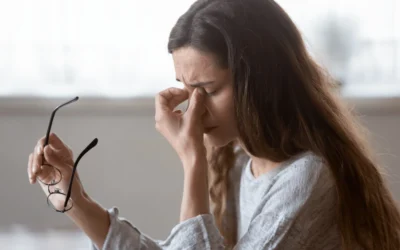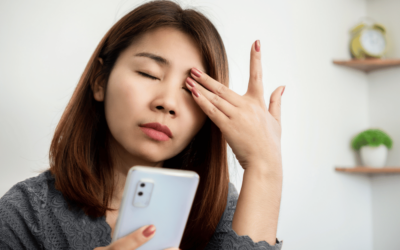Are you experiencing dry, irritated eyes? Menopause could be the culprit. As we age, our bodies undergo many changes, and menopause is a natural part of the aging process. Unfortunately, this transition can come with some uncomfortable symptoms, including dry eye.
Dry eye is a condition where your eyes don’t produce enough tears or the quality of the tears is poor, leading to discomfort, itchiness, redness, and blurry vision. If you’re experiencing dry eye symptoms, you’re not alone, and there are effective treatments available. Let’s look at what causes menopause-related dry eye and where you can find dry eye treatment near Orange, West Haven, Stratford, Monroe, and New Haven, Connecticut.
The link between menopause and dry eyes
Dry eye can be caused by a variety of factors, such as aging, environmental factors, and underlying health conditions like lupus, rheumatoid arthritis, and Sjögren’s syndrome. However, hormonal changes during menopause are one of the main causes of dry eye in women. During menopause, estrogen levels drop, leading to a decrease in tear production. Estrogen also helps regulate the oil gland secretions in your eyelids, and when this regulation is disrupted, it can cause dry eye symptoms.
Fortunately, there are a number of ways to help manage menopause-related dry eye.
1. Use artificial tears
One of the simplest treatments for dry eye is using artificial tears. Over-the-counter eye drops can help soothe and temporarily relieve dryness and irritation in your eyes. Look for drops that are labeled as lubricant eye drops or artificial tears. Avoid drops that are designed to treat red eyes or allergies, as these can make your dry eye worse.
2. Try prescription eye drops
If over-the-counter drops aren’t effective, your eye doctor may recommend prescription eye drops. They are specially formulated to provide long-lasting relief and can help improve overall eye comfort.
3. Use warm compresses
Warm compresses can help alleviate dry eye symptoms. Simply wet a washcloth with warm water and place it over your eyes for a few minutes. The heat will help stimulate tear production and lubricate your eyes. You can use warm compresses several times a day to relieve dry eye.
4. Take omega-3 supplements
Omega-3 fatty acids are essential nutrients that can help reduce inflammation and improve tear production. Taking omega-3 supplements can be an effective treatment for menopause-related dry eye. You can find omega-3 supplements in health food stores and online retailers. However, it’s important to talk to your doctor before taking any supplements.
5. See an eye doctor
If you’re experiencing persistent dry eye symptoms despite your best efforts to manage them on your own, it’s a good idea to schedule a comprehensive eye exam with an eye doctor. Your eye doctor can recommend menopause dry eye treatment, such as prescription eye drops or punctal plugs, to alleviate your symptoms. In rare cases, surgery may even be recommended.
At Lighthouse Vision in Milford, we offer advanced IPL (intense pulsed light) therapy and radiofrequency (RF) treatment for dry eye disease caused by meibomian gland dysfunction. Hormonal changes during menopause can impact the meibomian glands, which are essential for maintaining healthy, comfortable eyes. IPL therapy uses precise pulses of light to reduce inflammation and stimulate these glands, while radiofrequency treatment applies gentle heat to improve oil flow and gland performance. Together, these therapies help relieve dry eye symptoms and support long-term eye comfort.
We can also suggest other treatments for dry eye, including prescription eye drops, oral supplements, and lifestyle changes. Our experienced optometrist will work with you to develop a personalized treatment plan that meets your specific needs.
If you are experiencing menopause-related dry eye, don’t suffer in silence. Our eye doctor offers dry eye treatment in Milford to help you relieve your discomfort and improve your quality of life. Schedule an appointment with us today and let us help you find the relief you need.





